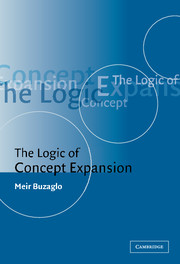Book contents
- Frontmatter
- Contents
- Preface
- Acknowledgments
- Introduction
- 1 Historical background
- 2 Frege's opposition
- 3 The grammar of constraints
- 4 Expansions as rational procedures
- 5 Implications for concepts
- 6 From words to objects
- 7 Gödel's argument
- 8 Implications for thoughts
- 9 “I was led astray by language”
- Epilogue: How do we go on from here?
- References
- Index
3 - The grammar of constraints
Published online by Cambridge University Press: 22 September 2009
- Frontmatter
- Contents
- Preface
- Acknowledgments
- Introduction
- 1 Historical background
- 2 Frege's opposition
- 3 The grammar of constraints
- 4 Expansions as rational procedures
- 5 Implications for concepts
- 6 From words to objects
- 7 Gödel's argument
- 8 Implications for thoughts
- 9 “I was led astray by language”
- Epilogue: How do we go on from here?
- References
- Index
Summary
As we have seen, Frege absolutely excluded expansions from the realm of logic, because he claimed that logic involves the laws of truth, and truths are not developed, but can only be derived from other truths. But then we remain with the question about what to do with the process that other mathematicians and philosophers describe as “expanding a concept.” Two alternatives were suggested by Frege. The first, which considers expansions to be changes within the thinking subject, was criticized above. The second alternative is that the original concept has simply been replaced by a new one.
My intention in this chapter is to present an analysis of non-arbitrary expansions. I will begin with a criticism of Frege's second alternative, which can then be generalized to a description of the development of concepts in terms of embedding a given model into a richer one. This emendation leads to the main section of this chapter, which presents a framework for introducing several kinds of non-arbitrary internal expansions, and closely examines the issue of the completeness of certain logics that arise naturally out of the consideration of expansions.
BETWEEN REPLACEMENT AND GROWTH OF CONCEPTS
The third argument discussed in the previous chapter makes it clear why Frege insists that concepts do not develop, but rather that one concept is replaced by another. But even though this description provides somewhat of a solution to the problem, it raises even more difficult problems.
- Type
- Chapter
- Information
- The Logic of Concept Expansion , pp. 38 - 53Publisher: Cambridge University PressPrint publication year: 2001



